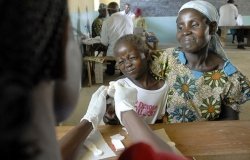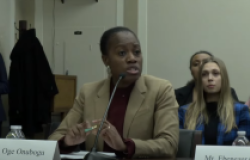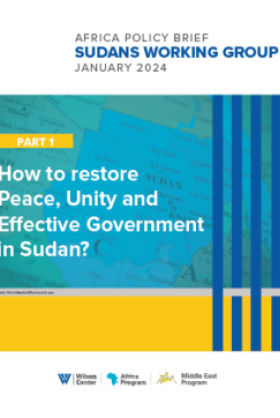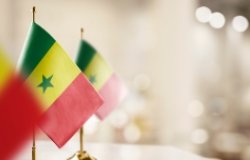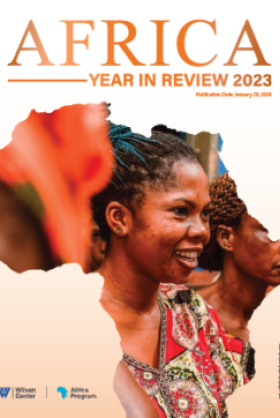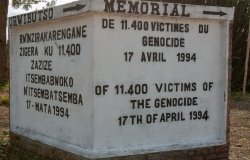Conflict and Development in Africa: The Egyptian Perspective
A discussion with Ambassador Mohamed Higazy and Ambassador Maasoum Marzouk, two of the Egyptian Foreign Ministry's senior Africanists, on Egypt's role in promoting peace and democracy on the continent. Remarks now online
Overview
Dr. Higazy's remarks are available in the "see also" box on the right of this page.
Mohamed Higazy, Assistant Foreign Minister for African Affairs, MiniAmbassador stry of Foreign Affairs, Arab Republic of Egypt
Ambassador Maasoum Marzouk, Director of the Sudan Department, Ministry of Foreign Affairs, Arab Republic of Egypt
Moderator: Ambassador Richard Bogosian, State Department Bureau of Intelligence and Research
Ambassador Higazy, one of the Egyptian Foreign Ministry's senior Africanists, discussed the role of Egypt in promoting peace and development in Northern and Eastern Africa as well as its broader role within the continent. Located at the crossroads of Africa, Asia, and Europe, Egypt, Higazy noted, has a significant role in efforts to strengthen inter-African collaboration, Afro-Arab cooperation, and Afro-European dialogue.
Principally, Higazy outlined Egypt's extensive commitment to African conflict transformation and development. He emphasized the supportive role Egypt played in several African independence movements and reconfirmed Egypt's continued dedication to peace, security, and development on the continent through various conflict-resolution initiatives in Ethiopia, Eritrea, the Great Lakes region, Liberia, and Sierra Leone. He highlighted Egypt's involvement in twenty two United Nations peace-keeping operations since 1960, including the current UN mission in Sudan (UNMIS), and noted that Egypt is also a member of the Africa Union and the African Union's Peace and Security Council. As such, Egypt contributes military observers and police personnel to the African Union Mission in Sudan (AMIS) in Darfur.
Touching on the current contentious debate concerning the transition of the AU mission in Darfur to UN control, Higazy spoke directly of the need to recognize Africa's ownership of its peacekeeping operations and urged consideration of both the Sudanese government's position and that of the African Union member states in the decision process. In addition, he called for the establishment of stronger mechanisms between the African Union and the United Nations to ensure the success of the AU Mission in Darfur.
Higazy reviewed Egypt's plans to contribute to the future strengthening of Africa's peace and security operations on the continent including the formation of the North Brigade of the African Standby Forces (ASF) and the establishment of the Cairo Center for Conflict Prevention and Resolution and Peacekeeping in Africa as a training hub for African military and diplomatic capacity.
In addition, Higazy reinforced Egypt's commitment to furthering development efforts in the continent through education, regional integration, regional trade, and natural resource preservation initiatives. Specifically, Higazy noted the Egyptian Fund for Technical Cooperation with Africa (EFTCA), founded in 1980, that provides educational scholarships and training programs in over 45 African countries, and the Mubarak Initiative for Education in Africa that recently awarded 200 fellowships for Africa students to study in Egypt over the next four years.
With respect to regional cooperation within the AU, Higazy highlighted Egypt's proposals to create an African Center of Endemic and Infections Diseases and HIV/AIDS, a Pan-African satellite channel, a Center for Science and Technology, and an Africa Center for Disaster Relief. Economically, Higazy noted that the Regional Investment Agency of the Common Market for East and Southern Africa (COMESA) that seeks to advance inter- African economic integration is headquartered in Egypt. Egypt holds observer status in the Economic Community of West African States (ECOWAS), and is a founding member of the New Partnership for African Development (NEPAD). Lastly, regarding natural resource preservation, Higazy highlighted Egypt's role in consolidating the Nile Basin Initiative that seeks to achieve water security and promote economic development amongst nations who share the waters of the Nile River.
Higazy concluded his remarks with reference to Egypt's organization of recent Afro-Arab and Afro-European summits through which Egypt intends to capitalize on its unique global location and relationships to further promote African development.
Ambassador Mazouk elaborated on Egypt's position on the Sudanese conflict. He highlighted Sudan's strategic location within the continent and reinforced the need for adequate resources to stabilize the situation noting that Sudan's instability threatens the security of the whole region. However, Marzouk was optimistic about the potential for peace in Sudan. He praised the African Union's efforts to secure peace in the country encouraging the international community to focus on "building peace and cultivating the culture of peace."
He stated that Egypt primary intention is to facilitate the re-establishment of the rule of law in Sudan and negotiations between the opposing parties. He referenced Sudan's lack of infrastructure as a major obstacle to the international community's ability to access the worst conflict-afflicted areas and effectively provide humanitarian assistance. Consequently, he noted, there is an urgent need for extensive financial assistance to restore and reconstruct Sudan's infrastructure, including its transportation, health care, and educational facilities.
Additionally, Mazouk emphasized the need for improved interaction and broad participation from the Sudanese people to support the peace efforts. To achieve a greater level of participation, Marzouk encouraged the international community to create an environment conducive to a peace settlement through the removal of sanctions, introduction of disarmament and reintegration policies, and initiation of reconstruction activities in Sudan.
During the question and answer session that followed, the presenters affirmed Egypt's investment in a stable, secure, and ably governed Somalia. They outlined Egypt's efforts to support a meaningful dialogue amongst Somalis and reiterated Egypt's support for the African continent as a whole. Both Ambassadors's reaffirmed Egypt's determination to promote development in Africa through increased integration.
Diane Yameogo and Georgina Petrosky, Leadership Project, xt 4083
Howard Wolpe, Director
Hosted By

Africa Program
The Africa Program works to address the most critical issues facing Africa and US-Africa relations, build mutually beneficial US-Africa relations, and enhance knowledge and understanding about Africa in the United States. The Program achieves its mission through in-depth research and analyses, public discussion, working groups, and briefings that bring together policymakers, practitioners, and subject matter experts to analyze and offer practical options for tackling key challenges in Africa and in US-Africa relations. Read more

Middle East Program
The Wilson Center’s Middle East Program serves as a crucial resource for the policymaking community and beyond, providing analyses and research that helps inform US foreign policymaking, stimulates public debate, and expands knowledge about issues in the wider Middle East and North Africa (MENA) region. Read more
Thank you for your interest in this event. Please send any feedback or questions to our Events staff.




